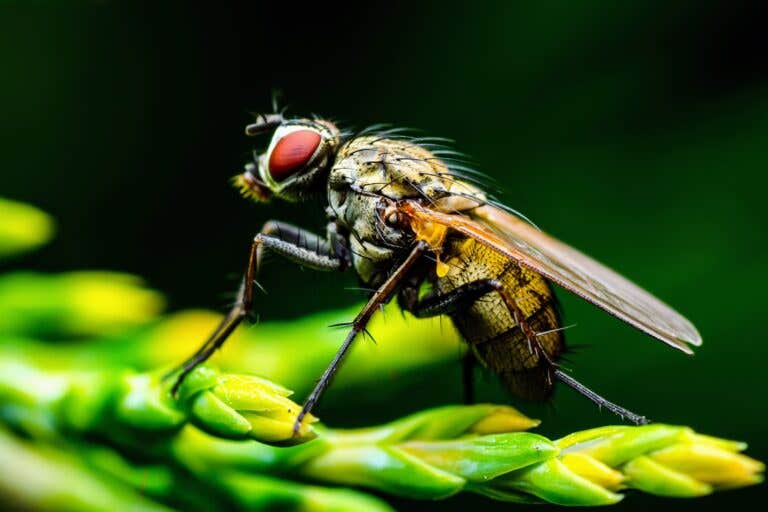Breakthrough unlocks the secret of virgin birth: Implications for the future of reproduction
University of Cambridge scientists have identified and triggered a genetic mechanism that allows virgin birth, known as “parthenogenesis”.

[July 29, 2023: Staff Writer, The Brighter Side of News]
One strain of this fly reproduces only through virgin birth. (CREDIT: Jose Casal and Peter Lawrence)
In a groundbreaking discovery, scientists from the University of Cambridge have identified and triggered a genetic mechanism that allows virgin birth, known as "parthenogenesis", in the fruit fly Drosophila melanogaster – a creature that typically reproduces sexually. This newly acquired capability, once activated, can be inherited by subsequent generations, revealing potential profound implications for evolutionary biology and agriculture.
Most animals reproduce sexually, necessitating the fertilization of a female's egg by a male's sperm. However, parthenogenesis allows eggs to develop into embryos and eventually into fully-formed offspring without the intervention of male sperm. Remarkably, the offspring resulting from virgin births are not mere clones of their mothers but are very close genetically, always manifesting as females.
Dr. Alexis Sperling, a key researcher at the University of Cambridge and lead author of the study, remarked, “We’re the first to show that you can engineer virgin births to happen in an animal – it was very exciting to see a virgin fly produce an embryo able to develop to adulthood, and then repeat the process.”
Her observations further indicated a unique behavior in the genetically modified fruit flies: "In our genetically manipulated flies, the females waited to find a male for half their lives - about 40 days - but then gave up and proceeded to have a virgin birth.”
Related Stories
While the potential for parthenogenesis existed, the occurrence rate remained low. In their laboratory experiments, only a mere 1-2% of the second generation of genetically altered female flies exhibited the capability for virgin birth. Interestingly, these births transpired exclusively in the absence of male flies. When potential mates were available, females opted for conventional reproductive methods.
The ability to switch to a virgin birth could act as an evolutionary buffer. In situations where finding a mate becomes improbable, parthenogenesis can serve as a critical survival mechanism, ensuring the continuity of a species.
The findings, which are now available in the esteemed journal Current Biology, were the culmination of meticulous research that spanned over six years and involved the examination of over 220,000 virgin fruit flies.
Researchers have identified the genes that are switched on, or switched off, when these flies reproduce without fathers. (CREDIT: Jose Casal and Peter Lawrence)
The investigative team began by sequencing the genomes of two strains of the fruit fly species Drosophila mercatorum. While one strain depended on males for reproduction, the other exclusively employed virgin birth. Through a careful comparison of the genomic structures, the team identified genes that were activated or deactivated when the flies underwent fatherless reproduction.
Armed with potential gene candidates responsible for parthenogenesis in Drosophila mercatorum, the scientists then tried to replicate the same genetic configurations in the commonly studied fruit fly, Drosophila melanogaster. The results were groundbreaking: for the first time, the Drosophila melanogaster exhibited the ability for virgin birth.
Dr Alexis Sperling in the laboratory (CREDIT: University of Cambridge/PA)
The success of this research is highly attributed to the choice of using the Drosophila melanogaster species. Known as the archetypal organism for genetic studies for over a century, the fruit fly's genetic landscape is well-charted, which made this genetic manipulation feasible. Dr. Sperling emphasized that achieving similar results in other animals would have been exponentially more challenging.
The ramifications of this discovery extend beyond the confines of mere academic interest. Dr. Sperling, who has since transitioned to the Cambridge Crop Science Centre, is eager to delve into the increasing prevalence of parthenogenesis in insect pests. “If there’s continued selection pressure for virgin births in insect pests, which there seems to be, it will eventually lead to them reproducing only in this way. It could become a real problem for agriculture because females produce only females, so their ability to spread doubles,” warned Sperling.
Dr Sperling (at left) in the lab with a student. (CREDIT: University of Cambridge)
While some oviparous animals, such as birds, lizards, and snakes, have naturally evolved the ability to reproduce without males, observing virgin births in animals that usually reproduce sexually remains a rarity. This phenomenon is most commonly documented in zoological environments where females have been isolated for extended periods, diminishing their prospects of locating a suitable mate.
This discovery has shed light on an astonishing and under-explored facet of reproductive biology. As science continues to delve into the enigmatic world of parthenogenesis, we may be on the brink of rewriting evolutionary paradigms and redefining agricultural practices in the future.
For more science stories check out our New Discoveries section at The Brighter Side of News.
Note: Materials provided above by The Brighter Side of News. Content may be edited for style and length.
Like these kind of feel good stories? Get the Brighter Side of News' newsletter.



